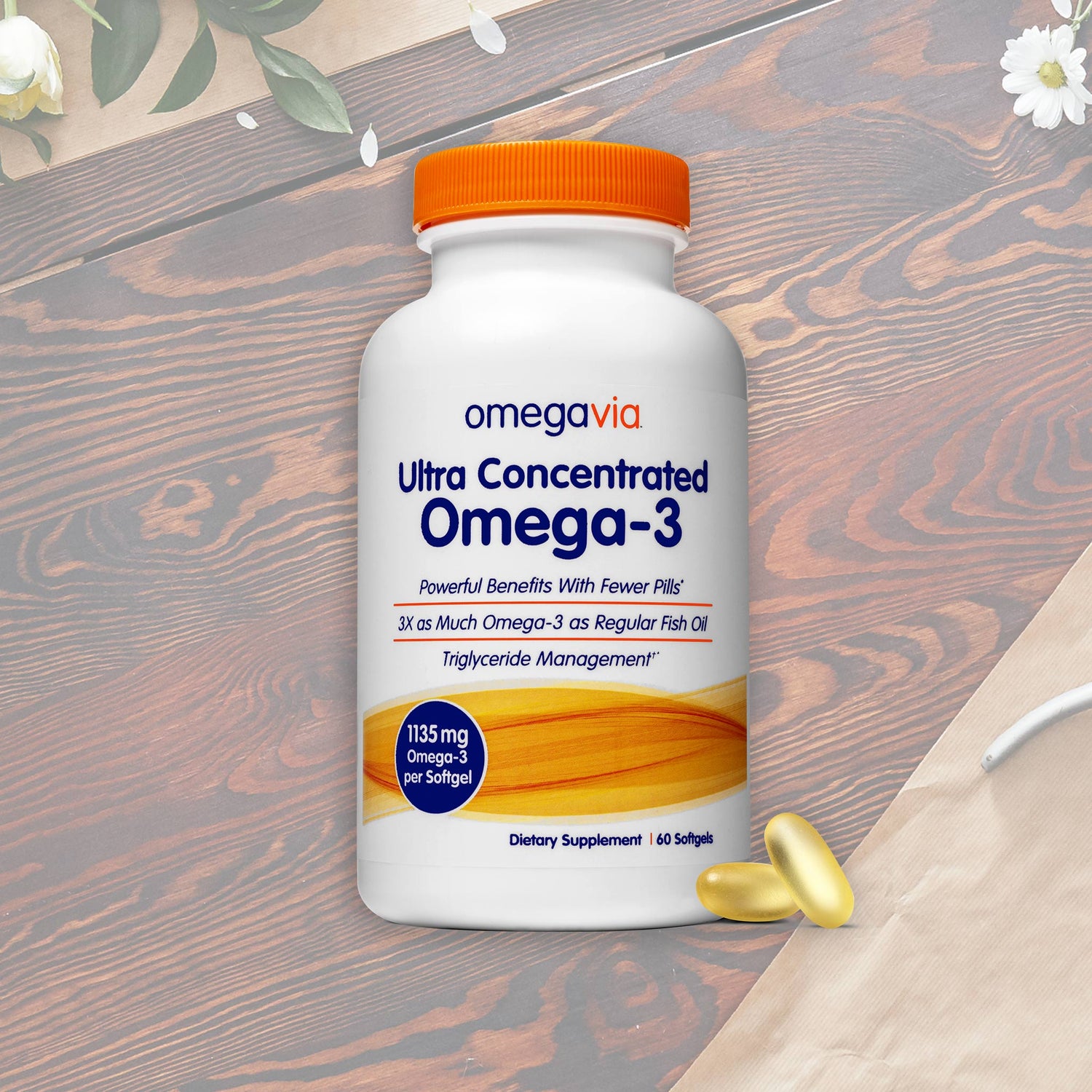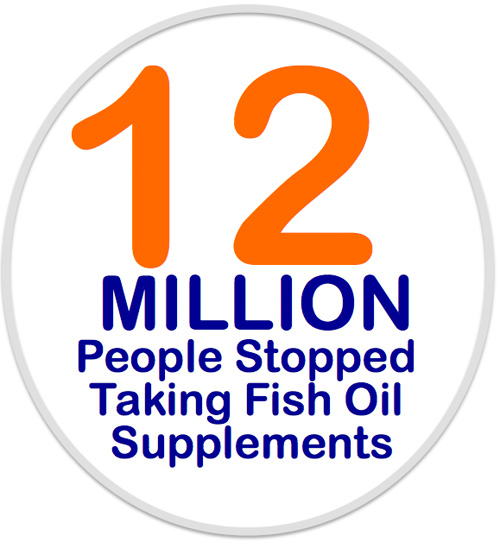 Twelve million Americans, mostly young women and middle-aged men, stopped taking fish oil supplements last year due to the alarming headlines linking fish oil and prostate cancer.[/caption]
The authors of that study have now published a new study that says 'there was no strong evidence' that fish oil caused prostate cancer.
Twelve million Americans, mostly young women and middle-aged men, stopped taking fish oil supplements last year due to the alarming headlines linking fish oil and prostate cancer.[/caption]
The authors of that study have now published a new study that says 'there was no strong evidence' that fish oil caused prostate cancer.
'No strong evidence' that fish oil causes prostate cancer
The Journal of the National Cancer Institute published a study in September 2014 that, in effect, said that it was a wash. There was no cause and effect between fish oil fatty acids and prostate cancer. Theodore Brasky and Alan Kristal, who were all over TV and radio telling us that fish oil causes cancer, are also coauthors of this new paper. Their words, then and now: (Keep in mind that the original study participants were not required to take or avoid fish oil supplements.) 2013: "We've shown once again that use of nutritional supplements may be harmful. The data doesn't support the use of Omega-3 fatty acids for anything. There is no good data. People like to believe that the supplements they take improves their health. It's all frankly just not true. I honestly can't say there is any condition where taking supplements makes sense. The best advice I could ever give to people is to just stop taking supplements." 2014: "There was no strong evidence that circulating fatty acids are important predictors of prostate cancer risk."This is what I had to say about it in 2013:
'The media circus around this study plays along with this researcher’s irresponsibility and personal bias. I think the authors are aware that their data does not support these statements. It’s not ignorance. It’s just career advancement. This kind of media attention brings funding and ensures job promotions, tenureship and all-around back-slapping. And the media? Well, fear-mongering sells. And in a facts-be-damned media circus, it’s always the supplement that gets taken out back and shot.' The original study was not about fish oil supplements. But virtually every interview about it became about fish oil supplements. After I published the above statement, I briefly met with Theodore Brasky, one of the authors, in February 2014. He looked uncomfortable and publicly distanced himself from co-author Alan Kristal. Yet, he continued to dig in and stand by his original unsupported statements, even though many of his more informed peers had openly criticized the study and the author's choice of words. This is what I have to say now: The media should have covered this new study with as much attention as they did the sky-is-falling headline last year. But sensationalism sells. Good news does not. (We just survived a million negative ads from the mid-term elections. I can't remember a single positive, informative political ad. It's what sells and it's what gets remembered.) So, what gives? Is the new study wrong? Or just more compatible with my preexisting bias? I don't think the new study is wrong - it is probably a fair assessment. Science often takes a fire-aim-fire route to understanding. That was never the issue. The issue was (and remains) the unfair coverage of health matters in the media and scientists who get caught up in the giddiness and end up making self-serving (rather than factual) statements.12 million quitters
But what about the 12 million people who quit taking fish oil because they were afraid of prostate cancer? Most of those who quit were middle aged men and young women - two groups who critically need Omega-3 for different reasons. Young women need large quantities of Omega-3 for pregnancy. Inadequate Omega-3 during pregnancy has serious consequences to both the mother and child. Middle aged men are the ones most aggressively treated for heart health. I doubt these 12 million people switched from taking fish oil supplements to eating salmon three times a week. Who is going to tell them that the media circus that made them quit fish oil is now officially inaccurate? Do Brasky et al. owe anything to those 12 million people? Science is a series of understandings, re-understandings and better-understandings. But that's not what happened with Brasky et al. Their data and the author's public interpretation of it were worlds apart. The new paper undoes some of the scientific damage, but not the public health damage, which remains a shameful chapter in Omega-3 history. And that of Ohio State University.Incident #2: a head-shaker and a head-slapper
Oh, the next little incident would be really funny, if it wasn't so sad. [caption id="attachment_11278" align="alignleft" width="500"]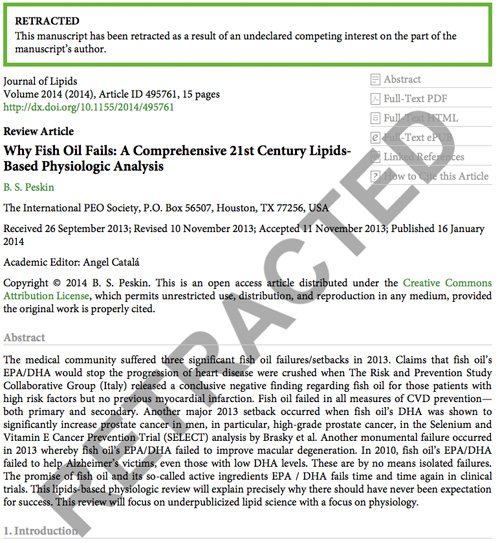 Journal of Lipids published this 'review article' in January 2014. It was retracted in November 2014. It's open access and still available for reading. Click on the image above.[/caption]
It involves Brian Peskin.
The Journal of Lipids retracted his paper titled 'Why Fish Oil Fails: A Comprehensive 21st Century Lipids-Based Physiologic Analysis'
If you read a lot of scientific papers, that title should have made flashing red lights come on in your head.
Journal of Lipids published this 'review article' in January 2014. It was retracted in November 2014. It's open access and still available for reading. Click on the image above.[/caption]
It involves Brian Peskin.
The Journal of Lipids retracted his paper titled 'Why Fish Oil Fails: A Comprehensive 21st Century Lipids-Based Physiologic Analysis'
If you read a lot of scientific papers, that title should have made flashing red lights come on in your head.
It is rare for a journal to retract a published paper
When a retraction happens, it is usually because there was a major mistake. In this case, Peskin did not disclose a conflict of interest. Peskin swims against the tide with his pro-Omega-6, anti-EPA/DHA stance. For reasons not fully explained in his retracted paper, he worships Omega-6 and denounces fish oil. He sells products that are rich in Omega-6 and ALA Omega-3, some of which he claims are cures for cancer. That this business interest was not revealed by Peskin to Journal of Lipids may not be surprising, but that the editors of the journal overlooked the contents of the paper is disturbing and very puzzling. Journal of Lipids is not exactly Annals of Internal Medicine or New England Journal of Medicine. Journal of Lipids is a you-pay-we-publish establishment. While that alone does not nod to unethical behavior, the peer-review editors were clearly asleep at the wheel in this instance.Here's a list of doozies:
The unnecessary big words. The mind-numbing details about nothing that lead to nowhere. The interwoven fabric of fact and hope. Just the right amount of science to dazzle and impress average Joes all across America. (You know, kinda like this blog.) The repeated references to the now-kaput Brasky paper (see above). The out-of-place aspirational marketing language in a science journal. Citing old college text books. The esteemed Dr. Michael Crawford sits on this journal's editorial board. There is no chance that Dr. Crawford would have allowed the publication of this paper had he reviewed the manuscript. The journal's editorial process did not vet the author's credentials or history. A quick Google search reveals that Peskin has paid $100,000 to the state of Texas for misrepresenting his credentials and making fraudulent medical claims.So, how did the paper get retracted?
Well, apparently several independent thinkers, including Steven Carney, contacted the publisher about the absence of real science in this paper. Canadian medical student, Ian Garber, found his 'pseudoscience sense tingle,' when he read the paper. So he contacted the journal about a missing conflict of interest declaration. And the editors finally (and quickly) did their jobs. Almost as if it was the first time they were reading the paper. The missing conflict of interest statement pointed out by Garber made it very easy for the journal to retract, save face and blame-shift.So what does all this mean to your health?
- It means that people will continue to promote their agendas, to publish papers, and to sell products, even if there is scant proof to support their positions.
- Question everything. Read a lot, not just one self-proclaimed expert. Yes, including the mindless rambling on these pages.
- Your health really is in your own hands.
Addendum:
Two more papers authored by Peskin have since been retracted by Scientific Research Publishing. [caption id="attachment_11716" align="alignleft" width="576"]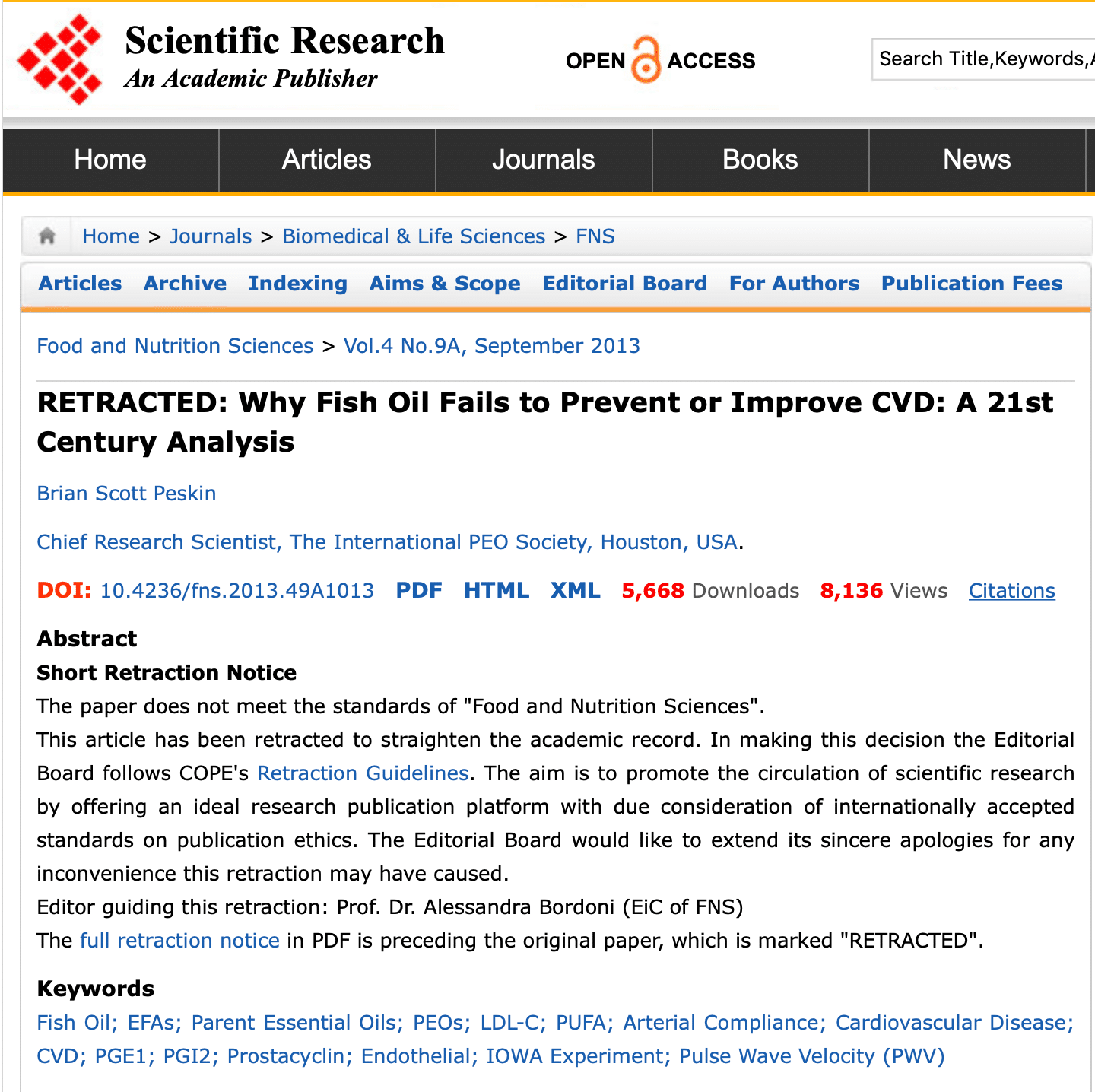 Food and Nutrition Sciences Journal, published by Scientific Research Publishing, has retracted a 2013 Peskin paper from 'to straighten the academic record.'[/caption]
[caption id="attachment_11714" align="alignleft" width="576"]
Food and Nutrition Sciences Journal, published by Scientific Research Publishing, has retracted a 2013 Peskin paper from 'to straighten the academic record.'[/caption]
[caption id="attachment_11714" align="alignleft" width="576"]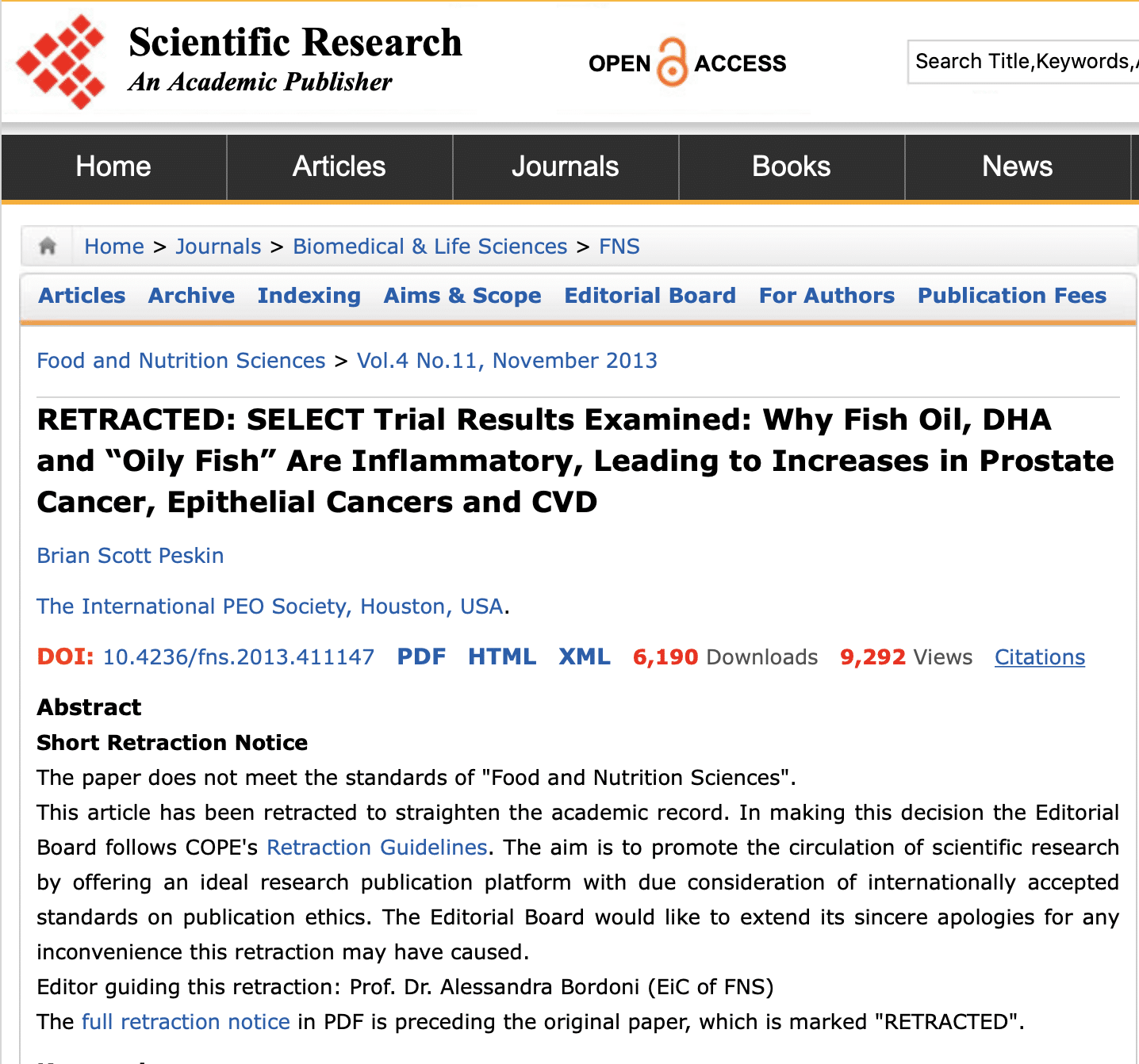 Food and Nutrition Sciences Journal has retracted a another 2013 Peskin paper with a strong anti-fish oil stance for the same reason.[/caption]
Food and Nutrition Sciences Journal has retracted a another 2013 Peskin paper with a strong anti-fish oil stance for the same reason.[/caption]
*These statements have not been evaluated by the Food and Drug Administration. This product is not intended to diagnose, treat, cure, or prevent any disease.
